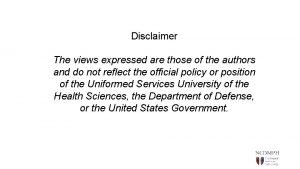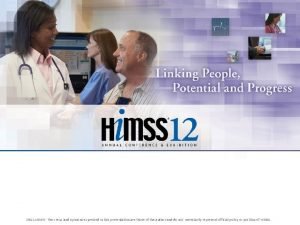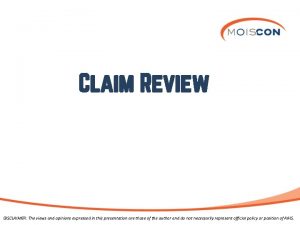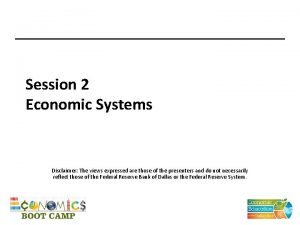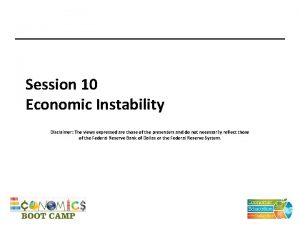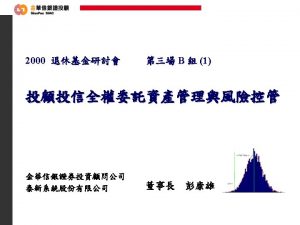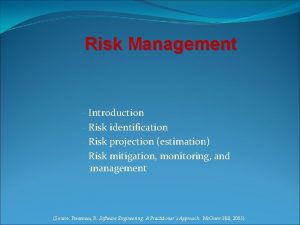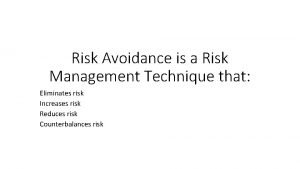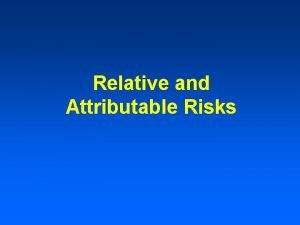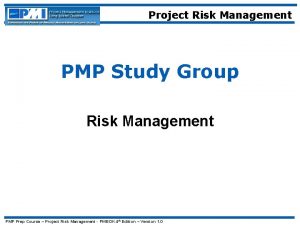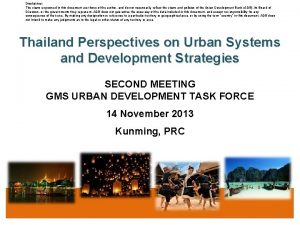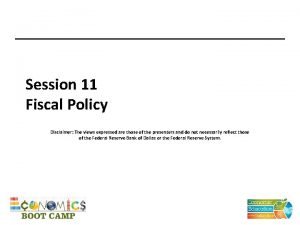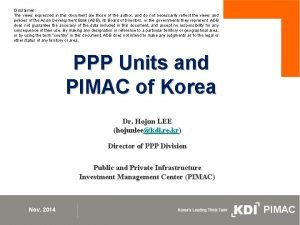Health Risk Communication Disclaimer The views expressed in
















- Slides: 16

Health Risk Communication

Disclaimer The views expressed in this presentation are those of the author and do not reflect the official policy or position of the Uniformed Services University of the Health Sciences, Department of Defense, or the U. S. Government.

Health Risk Communication The purpose of a public health response to a crisis is to efficiently and effectively reduce and prevent illness, injury, and death and return individuals and communities to a state of ‘normalcy’

Health Risk Communication Definitions: Risk: expose (someone or something valued) to danger, harm or loss Health Risk: the probability that damage (injury, disease, etc. ) will occur as a result of exposure to a threat (chemical, physical or biological agent for example)

Health Risk Communication “The risks that kill people and the risks that alarm them are completely different” -Covello and Sandman (2001)

Health Risk Communication Risk Perception How do we perceive risk? • Scientists, risk managers, businesses… Evidence-based assessment • General public… • Personal • Social • Cultural • Moral • Psychological • Emotional

Health Risk Communication Anatomy of a Crisis Uncertainty + Heightened public emotions (fear, anxiety, denial) + Limited access to facts + Rumor, gossip, speculation, assumption, and inference = Unstable information environment

Health Risk Communication Research has shown that during a crisis, people… ØTake in information differently (than normal) ØProcess information differently ØAct on information differently Communication during a health crisis, such as a pandemic, is especially challenging as a result

Health Risk Communication Definitions: Risk Analysis (Health) Risk Assessment – process to identify and describe a hazard, and evaluate/estimate the nature and probability of adverse health effects (Health) Risk Management – proactively/reactively preventing an incident or minimize damages (based on risk assessment) following an event Health Risk Communication – evidence-based strategy used to provide information that allows individuals, stakeholders, or communities to make the best possible decisions during a health-related crisis or emergency

Health Risk Communication

Health Risk Communication “Under the IHR, risk communication for public health emergencies includes the range of communication capacities required through the preparedness, response and recovery phases of a serious public health event to encourage informed decision making, positive behavior change and the maintenance of trust”

Health Risk Communication Key Points Health Risk Communication… Operational communication vs. communication with the public ØInvolves exchanging information about real or perceived health threats ØProvides information on expected positive and/or negative outcomes and their probabilities ØHelps to stabilize information environment Ø

Health Risk Communication Core Principles 1. Be First ü Crises are time-sensitive (emergency mentality) 2. Be Right ü Accuracy is essential to credibility (easy to lose) ü Information should include what is known, what is not known, and how gaps will be filled 3. Be Credible ü Reflect honesty and truthfulness

Health Risk Communication Core Principles 4. Express Empathy ü Harm and suffering should be acknowledged ü Address people’s feelings and the challenges they face 5. Promote Action ü Give people constructive and meaningful actions – sense of control 6. Show Respect ü Be respectful of emotions, questions, concerns ü Avoid humor

Health Risk Communication Failures • • • Information released late Mixed messages from multiple experts/leadership Paternalistic attitudes Not countering myths and rumors in real time Public power struggles and confusion

Health Risk Communication Former President Obama’s Comments on America's Response to Ebola: “This disease can be contained. It will be defeated. Progress is possible. But we're going to have to stay vigilant and we've got to make sure that we're working together. We have to keep leading the global response. America cannot look like it is shying away because other people are watching what we do, and if we don't have a robust international response in West Africa, then we are actually endangering ourselves here back home. In order to do that, we've got to make sure that those workers who are willing and able and dedicated to go over there in a really tough job, that they’re applauded, thanked and supported. That should be our priority. ”
 The views expressed disclaimer
The views expressed disclaimer The views expressed here disclaimer
The views expressed here disclaimer The views and opinions expressed
The views and opinions expressed Views expressed disclaimer examples
Views expressed disclaimer examples The views and opinions expressed disclaimer abs-cbn
The views and opinions expressed disclaimer abs-cbn Views expressed disclaimer
Views expressed disclaimer Views disclaimer
Views disclaimer Disclaimer the views expressed
Disclaimer the views expressed All opinions expressed disclaimer
All opinions expressed disclaimer Disclaimer about opinions expressed
Disclaimer about opinions expressed The views and opinions expressed
The views and opinions expressed Market risk assessment
Market risk assessment What is risk projection in software engineering
What is risk projection in software engineering Avoidance risk
Avoidance risk How to calculate relative risk
How to calculate relative risk Residual risk and secondary risk pmp
Residual risk and secondary risk pmp Tracing vs vouching
Tracing vs vouching

